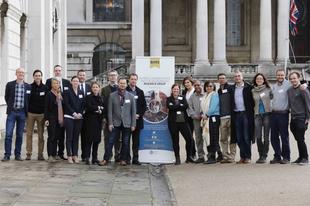Electronics Watch Affiliate Meeting and Modern Slavery Symposium Attract a Full House
Thirteen Electronics Watch affiliate representatives joined an inspiring two days of events focusing on forced labour in global supply chains at the University of Greenwich in London, December 2016. The affiliate meeting on day one provided an opportunity for affiliates to meet representatives of Electronics Watch monitoring organisations from four regions of the world, and learn about monitoring methodology and the key issues they are uncovering. Affiliates and monitors also met the Board of Trustees and shared valuable perspectives on their priorities for Electronics Watch in 2017. On day two, four affiliates were featured as presenters at the Greenwich Symposium on Modern Slavery, Human Trafficking and Human Rights Risks in Global Supply Chains: Roles and Responsibilities of Public Buyers.
The Symposium, co-organised by Electronics Watch, attracted more registrants than the space could accommodate, especially from universities, city councils, and purchasing consortia, and four times as many participants as last year's symposium, indicating the growing commitment of public sector buyers to address human rights in their supply chains. Public Spend Forum Europe has featured a two part article (Part 1, Part 2) about the public procurement panel. Much credit goes to University of Greenwich faculty member and Electronics Watch Board member, Olga Martin-Ortega, for coordinating the symposium, the Business Human Rights and the Environment Research Group (BHRE) for hosting, and the London Universities Purchasing Consortium (LUPC) for co-organising the Symposium.
Key note speaker Baroness Lola Young of Hornsey noted that less than 10% of the British population knows that there are forms of modern slavery and highlighted the importance of the Modern Slavery Act of 2015, the first antislavery legislation in the UK since the Abolition of Slavery Act in 1833. Section 54 of the Modern Slavery Act focuses attention on global supply chains. It requires any commercial organisation whose annual turnover is £36m or above to produce an annual "anti-slavery" statement describing the steps it has taken to ensure that slavery and human trafficking is not taking place in any of its supply chains or in any part of its own business.
Expert presenters on the labour rights, policy, and procurement panels that followed Baroness Young described the key steps to end modern slavery, human trafficking and human rights violations in global supply chains. The labour rights experts, Electronics Watch monitors, consistently stressed the importance of freedom of association and a meaningful collective voice for workers. "The only way in which you can explain how wages are so low in Mexico is the lack of independent unions," said one. "Less than 1% of workers belong to a real independent union." An expert from India stressed: "Workers are vulnerable to human rights violations. They earn terribly low wages. They can't have a decent life. It's extremely important that workers' voices are heard and unions are recognised by companies in India."
The public procurement and policy experts noted the importance of transparency in supply chains in order to impact human rights abuses. "Transparency is the main driver for change" said one. "Public buyers have to ask the questions. Brands need to know, and show that they know. We need to hold them accountable." They also stressed the importance of a combined hard-soft approach, enforceable rules, on the one hand, education on the other. "Criminalisation is important, but so is education and raising awareness," one panelist observed about modern slavery in the UK. And from a practical perspective, many presenters said that there could be no real solution going it alone. "Collaboration is key. If you have a policy and it's clearly stated on your website and in your tenders, then that's the first step. But, how do you actually get change? That's where collaboration is really key."


